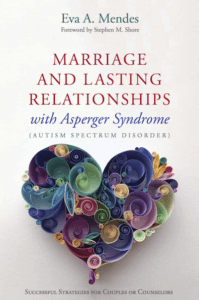
Guest post by Rutherford G (pseudonym)
Hi everyone! I’ve had Asperger’s since I was diagnosed at 8-years-old! I’m a young adult now and am taking on the world independently! As the case is with anyone doing that for the first time, it’s been rather hard, and without the consistent coaching I’ve gotten for my whole life, sometimes things get more difficult than I could have ever expected.
Part of having Asperger’s is struggling with interpersonal relationships, and I am no exception. Eva’s book has reinstated some of the support I’ve been familiar with, and I could not be more grateful. I’m able to build relationships in ways I’ve only seen neurotypical people do with (relative) ease because of the lessons taught in each chapter! I highly recommend reading this if you have ASD or know anyone with ASD; we all can learn a thing or two about building relationships between NS and ASD people, and this book is a wonderful way to do that.
Here are some of my favorite quotes from Marriage and Lasting Relationships with Asperger’s Syndrome and my reflections on it!
Foreward:
“Neurodiversity [is] a different, rather than disordered way of being. Considering Autism and related conditions as a difference rather than pathologizing the condition forms a sturdy foundation for the numerous brilliant strategies in this book.” page 11, Marriage and Lasting Relationships with Asperger’s Syndrome (MLRAS)
If we look at ASD as a different way of living, rather than a debilitation, perhaps we can work at understanding each other with enthusiasm! It is also important to know yourself, whether you’re a person with ASD or not, so you can work on living in a world that is compatible with all types of people.
The ASD Partner’s Relief:
“Many undiagnosed adults, consciously or unconsciously, have been seeking an explanation for their ASD traits… the partner with ASD can thus [upon being diagnosed] feel enormous relief at the discovery that his brain is wired differently.” – page 51, MLRAS
With no ASD diagnosis, it can be distressing when your partner exhibits traits such as anger, temper tantrums, OCD-like or ADHD mannerisms, high anxiety, lack of emotional reciprocity or affection, low sexual desire, reclusiveness, compulsive procrastination, and a myriad of ASD traits. Eva explains questions about diagnosis very well in her book.
Learning and Understanding ASD:
“By learning and understanding how ASD manifests itself in neurodiverse marriages, both partners realize that they are working with two completely different operating systems. The ASD brain and the NS brain just don’t work the same, and it’s important to know how to work with these differences.” – page 58, MLRAS
“Learning about ASD is important for both partners. For the partner with ASD, the understanding and acceptance of ASD marks an important time to start a journey towards self-awareness. He can finally start learning about his NS partner’s outlook and traits.” – page 62, MLRAS
An NS-AS marriage can be a challenge, but it’s one that both partners will have to participate in for the marriage to last. Learning how each other think can be a fulfilling, and even fun, process in one’s relationship.
Finding ASD Traits in the Family: Taken from Sue and Helen’s Story
“Sue and Helen heard about ASD only a few weeks ago after their daughter was diagnosed. While reading about ASD traits, it dawned on Sue that she shared many of her daughter’s traits.” – page 59, MLRAS
If one of your family members gets diagnosed with ASD, it could happen that you notice some similar traits in yourself or other family members, in which case you should not be afraid to seek the advice of someone trained to diagnose ASD for you or them.
Planning Ahead
After knowing someone with ASD for a while or even a little bit, it is a good idea to add the factor that is there ASD into the activities that you both do together. Eva gives some examples of this in her book:
“For individuals with ASD, anxiety is often related to sudden changes and fear of the unknown. For example, a man with ASD might experience a spike in anxiety because he does not know what is expected of him at an office party or what present his wife would like for her birthday. This distress can not only affect him, but also his wife; therefore, it’s most important that he learns to manage his anxiety by planning ahead and preparing for things that are likely to stress him out.” – page 76, MLRAS
Know Yourself:
“The first thing you have to know is yourself. A man who knows himself can step outside himself and watch his own reaction like an observer.” – Adam Smith – page 83, MLRAS
Eva has used a number of quotes by well-known people to drive some of her points home. Being an aspie, I tend to like quotes and find this very appealing. This one in particular speaks to me to always take time to learn about yourself, as well as others!
Trauma from the ASD Partner’s Meltdowns
Understanding takes time, the subsequent healing process make take even more. Eva speaks about how the anger issues and meltdowns of an ASD partner can take a toll on the NS (or non-spectrum) partner.
“The anger issues of the partner with ASD can make the NS partner become traumatized. He may even develop symptoms of PTSD. It’s important to understand that even after the anger outbursts and hurtful behaviors stopped, healing from past trauma can take time. What’s difficult in these situations is that the partner with ASD seems to move on fairly quickly from the negative interaction, while the NS partner may require some time to heal over an extended period of time.” – page 82, MLRAS
Theory of Mind:
It can be hard to conceptualize another person’s way of thinking, especially with ASD. It is important to cultivate good theory of mind so that a mutual understanding of one’s relationship can be achieved.
“Most adults with ASD find it harder to consider or hypothesize about another person’s mental or emotional state.” – page 93, MLRAS
“Studies show that 4-to-6-year-old NS children understand the cause and effect between a stimulus and emotional response; whereas children with ASD at the same age may not seem to understand the correlation between the two.” – pages 92-93, MLRAS
“A marital partner with weak [Theory of Mind] may unintentionally say and do things in a relationship that can come across as insensitive and hurtful to her NS partner. The NS partner may mistakenly assume that his wife is being deliberately hurtful. Over time the hurt feelings, pain, and suffering of the NS spouse can cause a breakdown in the neurodiverse marriage.” – pages 93, MLRAS
To be continued in a subsequent blog post as Quotable Quotes from Marriage and Lasting Relationships with Asperger’s Syndrome! Part 2




